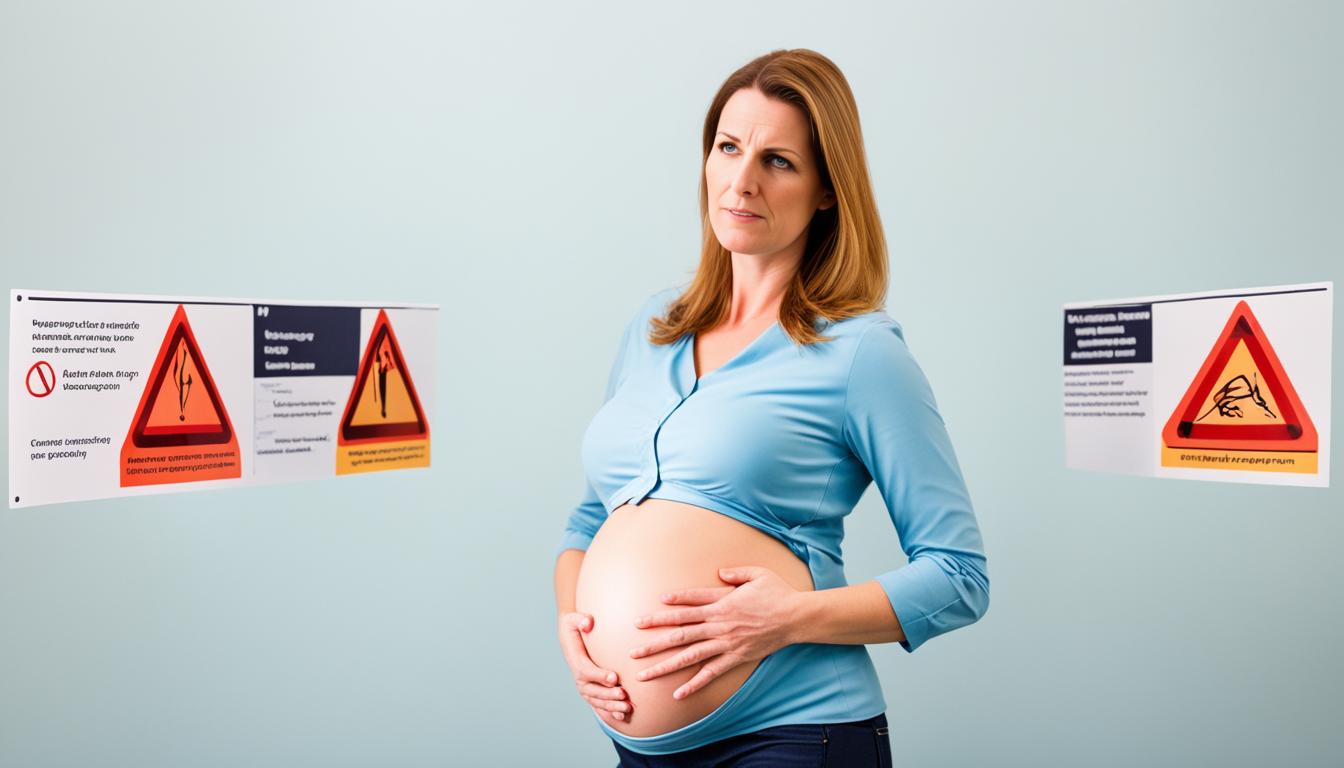Pregnancy is often compared to a delicate ballet, where every move and expression holds importance. Just like how a gentle breeze can sway even the strongest of trees, the debate on whether orgasms in the first trimester can lead to miscarriages sparks a mix of curiosity and caution.
As we explore this intricate connection, understanding the nuances and implications becomes important for maneuvering this uncharted territory with confidence.
Key Takeaways
- No evidence supports orgasms causing first-trimester miscarriages.
- Orgasms are generally safe in early pregnancy.
- Uterine contractions during orgasm pose minimal risk.
- Consult healthcare provider for personalized advice on orgasms during pregnancy.

Intimate Rose Pelvic Wand, Pelvic Floor Muscle Trigger Point Massager, Perineal Massage Tool for Pelvic Physical Therapy & Pain Relief, BPA-Free, Latex-Free, Standard (Non-Vibration)
Take Control of your Pelvic Health & Comfort: Our pelvic trigger point massager empowers you to facilitate muscle…
As an affiliate, we earn on qualifying purchases.
As an affiliate, we earn on qualifying purchases.
Potential Risks of Orgasms in First Trimester
During the first trimester of pregnancy, concerns about potential risks associated with orgasms may arise. One common worry is whether orgasms can cause miscarriage during this sensitive time. However, based on current scientific knowledge, there's no evidence to suggest that orgasms lead to miscarriage in the first trimester. Miscarriages that do occur during this period are usually due to chromosomal abnormalities rather than activities such as sexual intercourse or orgasm.
It is essential for expectant mothers to understand that the uterus is well-protected during pregnancy, and normal orgasms typically don't pose a risk to the developing fetus. In fact, the hormones released during orgasm can promote relaxation and a sense of well-being, which can be beneficial during pregnancy.
Despite this reassuring information, it's always recommended to consult with a healthcare provider for personalized advice on sexual activity and orgasms during the first trimester. Your healthcare provider can offer guidance tailored to your individual circumstances and address any specific concerns you may have.

Momcozy Pregnancy Pillows for Sleeping, U Shaped Full Body Maternity Pillow with Removable Cover – Support for Back, Legs, Belly, HIPS for Pregnant Women, 57 Inch Pregnancy Pillow for Women, Grey
Ergonomic Supportive Pillow – Momcozy full body pillow designs to replace the needs of multiple bed pillows, it…
As an affiliate, we earn on qualifying purchases.
As an affiliate, we earn on qualifying purchases.
Signs of Miscarriage After Orgasm
After experiencing an orgasm during the first trimester of pregnancy, individuals should be vigilant for signs of potential miscarriage, such as sudden and heavy vaginal bleeding. It's essential to pay close attention to any changes in your body to guarantee the well-being of both you and your baby.
Some signs of miscarriage after orgasm may include cramping or abdominal pain that worsens, passing tissue or fluid, persistent back pain, or a sudden decrease in pregnancy symptoms. If any of these symptoms occur following an orgasm, it's important to promptly consult a healthcare provider for evaluation and guidance.
Immediate medical attention should be sought if any unusual or concerning symptoms manifest after orgasm during the first trimester to rule out the possibility of a miscarriage.
- Sudden and heavy vaginal bleeding
- Cramping or abdominal pain that worsens
- Passing tissue or fluid
- Persistent back pain
- Sudden decrease in pregnancy symptoms

ChongErfei Maternity Belt, Pregnancy 3 in 1 Support Belt for Back/Pelvic/Hip Pain, Maternity Band Belly Support for Pregnancy Belly Support Band (L: Fit Ab 39.5"-51.3", Black)
✅RECOMMENDED BY OBSTETRICIANS: Medical studies show wearing a high quality maternity support belt, helps to promote a healthier…
As an affiliate, we earn on qualifying purchases.
As an affiliate, we earn on qualifying purchases.
Expert Advice on Orgasm and Pregnancy
Experts recommend maintaining open communication with healthcare providers to guarantee any concerns or inquiries regarding orgasms and pregnancy. During the first trimester, many expectant parents may have questions about the safety of orgasms and their impact on the pregnancy. It's generally considered safe for pregnant individuals to experience orgasms during this time, as there's no scientific evidence linking them to miscarriage in a normal, healthy pregnancy. Healthcare providers usually don't advise against orgasms unless specific complications are present. In fact, the hormones released during orgasm can promote well-being and relaxation, which can be beneficial during pregnancy.
To guarantee the safety and well-being of both the parent and the developing fetus, it's essential to consult a healthcare provider for personalized advice on sexual activity and orgasms during pregnancy. Open and honest communication with your healthcare provider can help address any concerns or provide reassurance about the impact of orgasms on the pregnancy during the first trimester.

Clearblue Fertility Monitor, 1 Touch-Screen Monitor, 1 Ct
FERTILITY MONITOR: Includes one (1) touch screen Clearblue Fertility Monitor (test sticks sold separately); proven to increase the…
As an affiliate, we earn on qualifying purchases.
As an affiliate, we earn on qualifying purchases.
Precautions for Safe Sexual Activity
When considering safe sexual activity during pregnancy, individuals with a history of threatened miscarriage should consult their healthcare provider for guidance. It's important to prioritize the well-being of both the pregnant person and the developing fetus. Here are some precautions for safe sexual activity:
- Consultation with Healthcare Provider: Your provider may advise on safe practices based on your unique medical history.
- Monitoring Unexplained Vaginal Bleeding: Any instances of unexplained vaginal bleeding should be promptly addressed and may require abstaining from sexual activity.
- Understanding the Impact of Orgasm during Pregnancy: While orgasms are generally safe and healthy during pregnancy, individuals with specific conditions may need to take precautions.
- Awareness of Amniotic Fluid Leakage: Any sudden gush or continuous leakage of amniotic fluid should be immediately reported to your healthcare provider.
- Educating Yourself: Stay informed by reading peer-reviewed studies and discussing any concerns with your healthcare provider to ensure a safe and healthy pregnancy journey.
Navigating Orgasms in Early Pregnancy
Considering the safety of sexual activity during pregnancy, particularly in the context of early pregnancy, it's important to address any concerns related to orgasms and their potential impact on the developing fetus.
In the first trimester, many expectant parents may worry about the risks associated with orgasms and the possibility of miscarriage. However, it's essential to understand that there's no scientific evidence linking orgasms to miscarriage during this stage of pregnancy. Orgasms during early pregnancy are generally considered safe, and the normal uterine contractions that occur don't typically pose a significant risk of miscarriage.
The body's natural protective mechanisms, along with the strong muscles of the uterus, help safeguard against any potential risks that may arise during orgasm in early pregnancy. If there are specific concerns or questions regarding orgasms and their impact on pregnancy, it's recommended to consult a healthcare provider for personalized advice and guidance tailored to individual circumstances.
Conclusion
To summarize, orgasms in the first trimester of pregnancy are generally safe and don't cause miscarriage. It's important to communicate openly with healthcare providers and take necessary precautions for a healthy pregnancy.
Just as the gentle waves of the ocean ebb and flow, our bodies undergo changes during pregnancy. Trust in the journey, seek guidance when needed, and embrace the natural rhythm of growth and development during this precious time.









